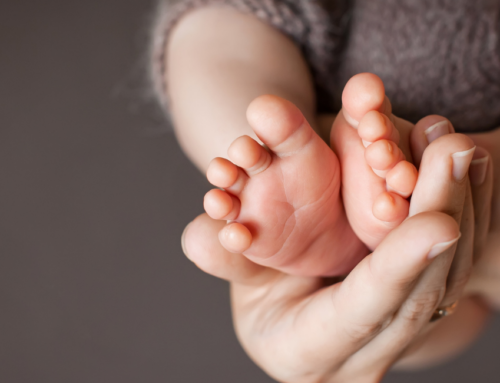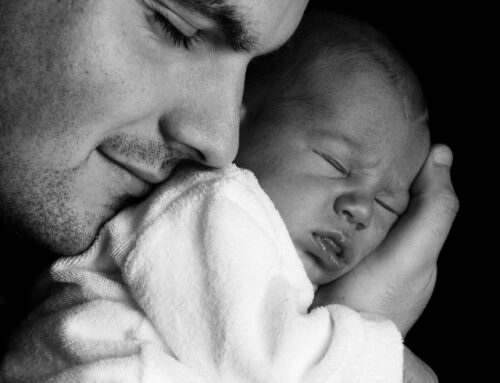
I was in the middle of the most physically and emotionally difficult year of my life. My health had been shaky, I was battling chronic pain and having difficulty finding foods that didn’t send my stomach into spasms. My fifth child was six months old and I was experiencing post-partum depression for the first time. I had secretly doubted the existence of that disorder, assuming that most women with PPD were just struggling with the normal fatigue-induced baby blues. I was wrong.
Every day, I dragged myself out of bed, slogged through my duties, ate my cereal (the only thing I seemed to be able to eat), took care of my children, and drove them back and forth between swimming pools where I waited for hours while they practiced.
I loved my family and took intellectual satisfaction in everything. But I felt nothing. I was numb. I couldn’t sew, couldn’t read, couldn’t exercise, couldn’t feel. I kept it to myself, believing that I could climb out unassisted. It took a full year on those terms and I emerged humbled and grateful — like a woman who has found herself swept away by the power of the sea and who finally and miraculously reaches dry land.
One of my small achievements during that time was quickly returning to my pre-pregnancy weight. I was starting to build up confidence and strength through a new exercise program. I could feel my hope returning as my body grew stronger. Yes, I was skinny. My jeans were a little big on me. But my chronically inflamed joints breathed with relief as the extra weight lifted off my small frame. I was not counting calories, I was clinging to hope.
On this particular day, I was attending a team Christmas party. I had the baby on my hip and was throwing a ball around with the kids. It feels good to move, I thought. The baby was getting heavy though and I tugged up my slightly drooping pants and joined the other moms by the refreshments. I need a new belt, I thought with a chuckle.
I drifted toward a mom who had always been friendly to me (a rarity in some youth sports circles) and I cheerfully drank my punch while we chatted. I could feel the sweat cooling on my forehead and a tiny spark of happiness rising. It wasn’t a conscious thought but a growing feeling. It is good to be alive.
But as we talked, the woman began to frown. Her frown deepened and she looked at me out of narrowed eyes. And interrupting our lighthearted pleasantries, she spoke to me with a concerned voice…
“Are you okay? Because you look really unwell. I’m worried about you. You’re a little… uh… thin.”
My smile froze and my mind stopped. My heart retreated. I felt myself descend. Unwell. Unwell. I am unwell. I immediately withdrew into myself and felt wildly self-conscious. I was aware of my sagging jeans, my dark circles, my anemic hair. My weakness. I wanted to hide.
Then the anger came. As I stared at the woman who had delivered her backhanded well-wishing with such shallow concern, I began to notice her appearance. She was at least 50 pounds overweight. Her skin was pale and unhealthy looking. Her feet were swollen in her shoes and the dark circles under eyes were dramatic. I had never seen her in quite that awful way before.
My tongue filled with a dozen biting, hurtful things the child in me wanted to say. But I did not say them. I swallowed the anger and moved on. I absorbed it. It became a part of me. I did not know how to forget.
It seems like a small incident and it was. But still, I carried that wound through three more pregnancies. I gained weight and judged myself by an image of perfection passed on through our culture that objectifies and abuses. I lost weight and, after the initial rise in confidence, all I could think was: Unwell. You look unwell.
And how… how did I allow the words of one woman to hold such authority over me? To objectify me and change my view of the truth?
When a woman speaks to another woman, she has the power to do great good or great evil. We are sisters and our words touch confidence and memory and worth. It is a deep bond full of mystery and treasure. We need to be able to lean in and trust. Instead, we often wound. Our negative words, backhanded compliments and need to pridefully lecture do several things:
* They manipulate a woman’s view of her own body.
* They introduce an unhealthy idea that might not have been there before.
* They objectify.
* They tempt her to anger.
* They tempt her to return the favor.
* They teach her that the lessons of childhood were true: In order to survive, we must wound.
In order to build and sustain a Culture of Life, we must break the cycle. We have the power to transform the culture through messages of Truth and Beauty. Love the women in your life. Lead by example. If you are concerned about the health of someone you love, approach gently so that she never doubts her fundamental worth…
And be prepared to walk with her through her doubts and fears.
It would have been best if that fellow swim mom would never have spoken that day. She did not know me or love me well enough to reach into my vulnerable places. Her words no longer have power over me but I have learned from them. When I remember the conversation now, I edit her words. And she tells me this:
It is so good to see you here! Having a new baby is hard work and you look like you are having some hard-earned fun. Good for you! Would you like me to hold her while you get something to eat?
And that’s all. Because love respects healthy boundaries and reveals the dignity of others. All women have a right to be loved like that. And it is the genius of womanhood to build up what others tear down. We have the power to transform the culture. Let us begin!





Thank you Melody. I have really enjoyed reading your blog and love that you are part of the Guiding Star Project. This article is so great. I always think of Genesis – there is enmity between Satan and the woman. So women are attacked. And to often we find ourselves attacking each other! Thank you for encouraging us to build each other up.
Thanks so much, Tisha! Wow… thanks for sharing your reflection on Genesis. So very true! God bless. 🙂